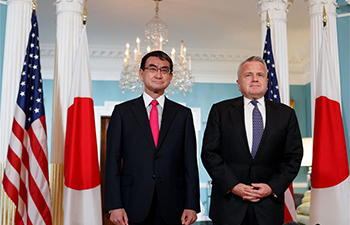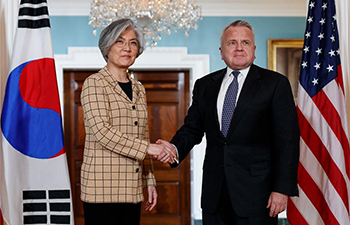MEXICO CITY, March 17 (Xinhua) -- Mexican consumers are having more confidence in e-commerce and consider it being close to offering complete security.
Communications expert Armando Tovar told Xinhua recently that the main challenge for e-commerce in Mexico is the complicated process to emit a "factura," the official form of receipt to register a financial transaction, after a purchase.
"Many sites have no option to provide a factura, and this can be a real problem," said Tovar, 41, who has been using American and Mexican e-commerce platforms for over a decade.
"I feel very confident about e-commerce platforms because until now I have not had any bad experiences," he added.
Currently, Tovar, who describes himself as an e-commerce addict, makes at least three orders per month, mostly on global platforms such as Amazon or Mercado Libre.
Mercado Libre, the Latin American e-commerce leader, finished 2017 with 125 percent year-on-year growth in Mexico, its largest expansion in the region.
The Internet marketing research firm, ComScore, said that Mercado Libre saw 6.5 million daily visits last year.
About this, Mercado Libre's director of classified ads, Rodrigo Hutt, said that the company has paid special attention for the last two years on fighting electronic fraud.
"We have an entire process against fraud, and we have greatly improved about this," said Hutt, "Mexico is a place with a high level of fraud, and we have been working strongly on this topic for the last two years."
Since 1999, the Organization for Economic Cooperation and Development has been developing norms to protect e-commerce consumers. These include a series of recommendations to ensure that sellers of goods and services online meet the requirements of consumer protection laws.
However, Ricardo Cordero, another decade-long user of e-commerce platforms, said that consumer protection laws vary too widely from country to country, especially in terms of return policies.
"These policies are difficult and complicated to apply in case they are not united," he told Xinhua. "Furthermore, there is no clear estimate on (acceptable) return times."
However, Cordero said that his experience with the likes of Amazon, Mercado Libre, or movie theaters selling tickets online had generally been good.
Last December, the president of the Mexican Association of Online Sales, Erik Perez, said that e-commerce could continue growing by double digits in Mexico in 2018, as more people gain access to the Internet.
According to official data released in February, the number of Internet users grew by 4.4 percent in 2017 to reach 71.3 million in Mexico.













